The Wickens Family Story
How a Montana Ranch Family Pays it Forward...
In between cattle drives, the Wickens gang likes to rob trains. They gallop from the hills, shooting and shouting, just beyond the Sage Creek trestle, and holdup a Lewistown-bound tourist train almost every Saturday from June until October. They board the train, empty the passenger pockets, tousle the heads of few small cowpokes and ride off into the sunset...just like in the movies. And, yes, they get paid for it, adding the “take” to a growing list of money-making ventures for the “new” ranchers of the 21st century, who have discovered that “cash-cows” are the backbone of a thriving ranch economy. Ranching in Montana, 2011, is a small herd of creative businesses.
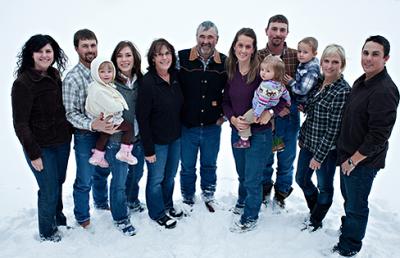
The Ranch
The Wickens Ranch celebrates its 100th birthday this year. Originally a 160-acre homestead farmed by Indiana transplant John L.Wickens in 1911, the Wickens family holdings of owned and leased land now number in the thousands of acres in remote Fergus County. For about 30 of the last 100 years the Wickens Ranch was a farming operation, wheat mostly, gradually shifting to cattle as decades of uncertain markets and the torment of fickle weather gradually stripped reliable profitability from crops. It was in the late 1990s that the John Wickens of a new generation went almost exclusively to cattle, ceding the farmland to grazing.
The ranch stretches across a rumple of hills between the Moccasin Mountains and the Missouri Breaks near Winifred (pop. 145), where the last train rails were peeled from the grain silos in 1976. It was then, according to John Wickens, that the local economy “turned back to grass,” and cattle ranching became the dominant business. John, his wife, Diane, and their four children have lifetimes in ranching, with sons, Eric and Matt, now trying their hands at the ranch-reins, while Nicole and Jason pursue artistic ventures in Missoula and Bozeman.

Enterprise
Ironically, the Wickens family land holdings have expanded as the cattle business has shrunk, with son Matt adding more acreage at the edge of the Breaks, where he has built a multi-purpose lodge for everything from his Dog Creek Outfitters hunting operation to weddings, parties, and reunions. Enterprise, it seems is in the Wickens’ family genes. After settling here in the early part of the 20th century, John Hickey, a Wickens ancestor, arranged for “Wild West” shows back East, creating income from the shows as well as from the sale of “broke” horses after bucking events. For a long stretch after that family members worked in road and reservoir construction, again for the extra income.
While both Eric and Matt are very focused on revitalizing traditional ranching through the right combination of “smart calving” and herd rotation, both brothers realize that ranching now means accepting the fact that profitability means diversification; and that diversification means...well, almost anything. “It’s all about cash flow,” John observes, rubbing his salt-and-pepper stubble, chin hammocked onto a broad hand, his smile and gaze warming the room across the steam of morning coffee. Diane nods and agrees. “Things would be a lot tighter if it was just cattle.”
Ironically, John has been the one to move his sons toward accepting diversity as part of the ranching business. A nimble list of moneyed enterprises ranging from paleontology licensing to “varmint hunts,” from ranch caretaking for absentee neighbors to leasing mineral rights for oil and gas exploration, keep the ranch profitable and viable in a way which suggests that the Wickens Ranch will be around for another hundred years. Not everything, though, has been a success. Dude ranching for vacationing families was a short-lived, though “very profitable” venture, as liability issues and the summer demands of ranch life proved too difficult a combination when adding to the mix small posses of expectant city slickers. In the end, cows trumped dudes.

The Herd
At times, it seems the Wickens’ cattle are almost an afterthought, that is until another newborn Angus plops black and wet onto the pasture and needs tagging or triage. Or until Eric, with degrees in range science and ranch management, makes his first Internet cattle buy of 40 or so Billings heifers. “Don’t think I’ll do that again,” he says as he eyeballs the nearby holding pen, “I think I got a good bunch, but I really kind of like to see them up close before I buy.”
Matt and Eric are ranchers at heart, and they are determined to bring the cattle business back from the teetering edge of profit-or-loss. They know they’ll hear of comments and advice from neighboring ranchers, about how they’re fixin’ to “sell the factory,” or that birthing calves in June is “just not right,” but after 30-plus years of watching their father struggle to make generations of cattle turn a buck, they know that traditional ranching needs change. As Eric tells it, “With margins so tight in the cow-calf industry, we are shifting the ranch to a more yearling-based business.”
John believes his sons will change Wickens’ ranching for the better. He is a man who can accept change in a business where change is viewed with suspicion and mired in the muck of tradition.
“I’ve had my run,” he says, “now let’s see what they can do.”
Sustainability
This attention to profitability of the cattle operation is reflected in the Wickens’ attention to the care and preservation of their ranch. The land is rough-and-tumble, unforgiving of abuse or silliness. John tells the story of a Georgia couple who made a large land purchase near the Judith River some years ago, creating a housing subdivision for...whom? The chuckles, snorts, and head-wags of long-time area ranchers were predictive. No offers were made, no lots were sold, and the land today looks and lies just the same as it has for millennia. No one knows where the Georgia couple is today. They seemed to disappear as suddenly as they had come.

Rather, the Wickens’ believe, they will let the land guide their business decisions. Though a brief, disappointing series of discussions with The Nature Conservancy resulted in no conservation easements, their plaque for “Undaunted Stewardship” is proudly displayed as both a challenge and a reminder of their ranch legacy. Ranch decisions—business decisions—are made after much discussion and forethought, resulting in improvements like responsible waterlines and cross-fencing, created in partnership with the Natural Resource Conservation Service.
Funding for stewardship, like so many other things these days, has been vilified as “pork,” now limiting the ability of the Wickens’ to continue some sustainable activities. “Managing rangeland is a much an art as a science,” Eric muses. “That’s my favorite part of ranching, improving the landscape so future people, cattle, and wildlife will be able to thrive on this piece of ground we are so blessed to take care of.”
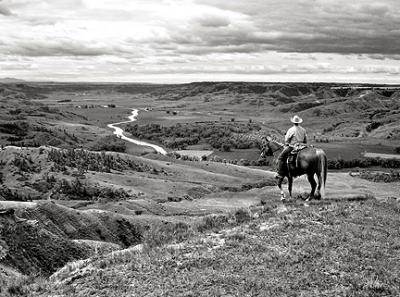
Family
Like a trail horse, no matter how far the Wickens family wanders from traditional ranching, it will follow a meander back to its core tradition. That tradition is inextricably bound with three generations of a family, which still honor the idea behind the small, original homestead of 1911.
The promise of self-sufficiency and the everyday challenge of Montana ranching have brought them through a full century of successes and failures.
On a chilly Saturday night at Eric and Emma’s home a new generation of Wickens children play happily among empty dinner dishes, half-filled beer bottles and rousing strums from Eric and Jason’s guitars. At midnight, three a.m., and 6 a.m., three of them will take turns on the newborn calf patrol. Diligent about minding the herd, they have lost only two of the hundred or so births this season.
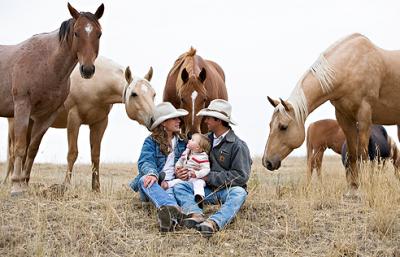
There is a peace and a closeness in the Wickens family, which is no doubt a product of many such nights when the core family, spouses and the next generation of child-ranchers come together to celebrate the old traditions. The true value of the ranch is its appreciation for generations of Wickens before and to come. “It’s a feeling and a satisfaction that I have trouble expressing,” says Diane. “It’s an appreciation for mother nature, the arrival of the meadowlarks and robins in the spring, and the yellow finches...the coyotes howling at night. The total quiet, with a sky full of stars at night. Watching the grandkids laugh and run through the hills as we pick wildflowers in the spring.”
“Our favorite thing,” John adds, “is the cattle drive, moving the herds through the canyons, across the Judith to green grass. We do it a couple times a year, and it reminds us all of why we call ourselves ranchers.”
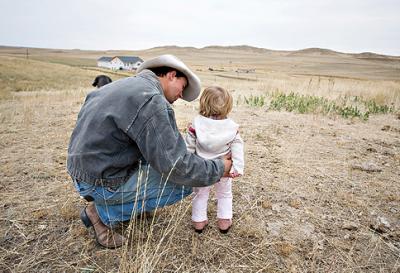
“We just really love being outdoors and being together, getting work done,” says Diane. “It’s a good and satisfying feeling at the end of the day, to know you’ve accomplished your goal and had fun doing it. To be able to do that with your family and neighbors is as good as it gets. We all have a deep appreciation for family, the land, the animals and the opportunity to be here. Yes, there are hard times and the weather and the markets are unpredictable, but it’s all part of the game.”
“There is no better life,” says John.
Wickens’ Family Ranch Enterprise
Farming & Ranching 1911-2000
Hunting 1975-Present
Gunsmithing 1995-Present
Varmint Shooting 1993-Present
Lodging/Weddings/Reunions 1993-Present
Train Robberies & Hangings 1994-Present
Ranch Caretaking 2007-Present
Dude Ranch Vacations 2000-2007
Oil & Gas Licensing 2007-2011
Paleontology Licensing 2007-2011
Film-Shoot Licensing 2009-2010
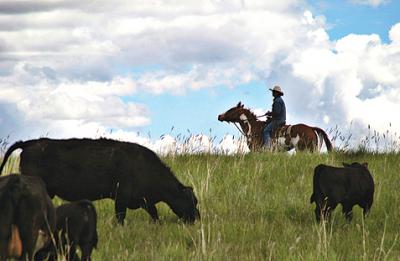
Dog Creek Outfitters
Game Hunts: Elk, deer, antelope, big horn sheep and birds
Accommodations:
Two first-lodges with equal trophy hunting opportunities. Each lodge has all the amenities of home: private bedrooms, full kitchens, hot showers, and laundry service.
Inquiries and Reservations:
Matt & Jamie Wickens
Box 92, Winifred, MT 59489
Gunsmithing
John Wickens, owner/operator of Wickens Gunsmithing has been an avid hunter, big game guide, re-loader, bench shooter, and basic “gun nut” all his life. John can help you build YOUR perfect rifle. Extensive knowledge of ballistics and field use is the Wickens’ guarantee for a custom rifle. From varmint hunting to big game hunting, John builds rifles for all occasions. Order a new custom-built rifle, or have him rebuild one out of your old favorites. He promises 100% satisfaction.
John and Diane Wickens
11955 Salt Creek Road
Hilger, MT 59451
(406) 462-5618
Jason and Jackie Wickens
Recording and Production Studio in Bozeman
Nicole Wickens
Wedding and Portrait Photographer, Missoula

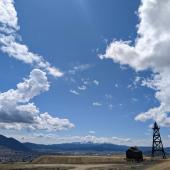







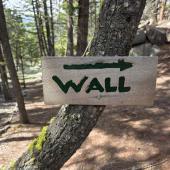
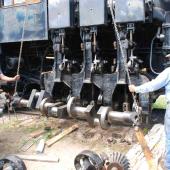

Leave a Comment Here